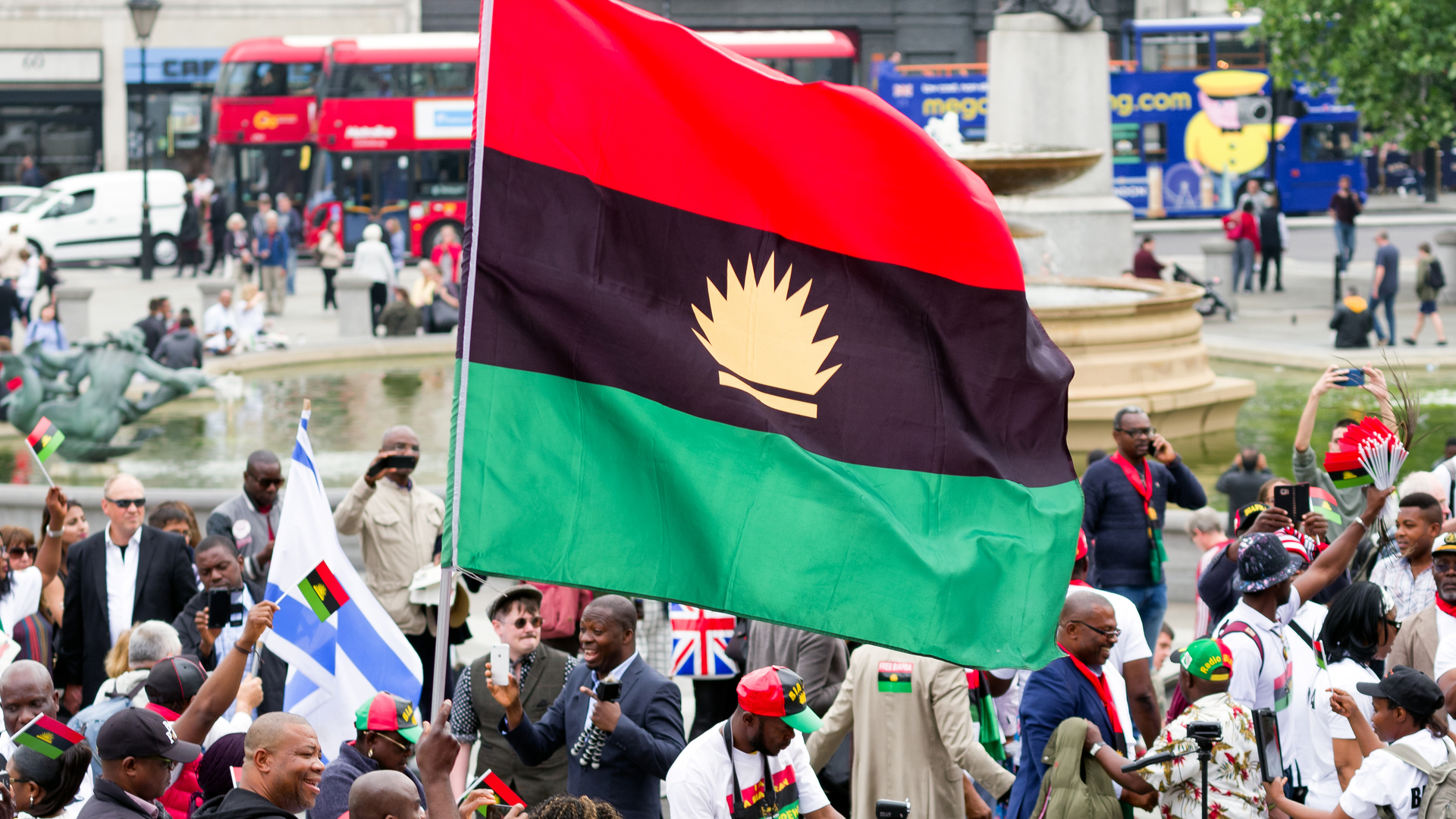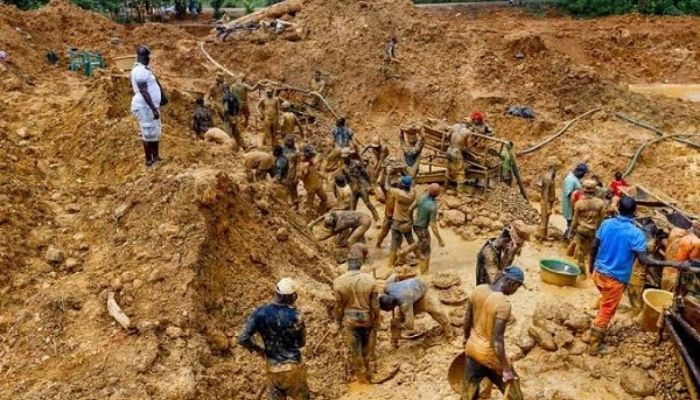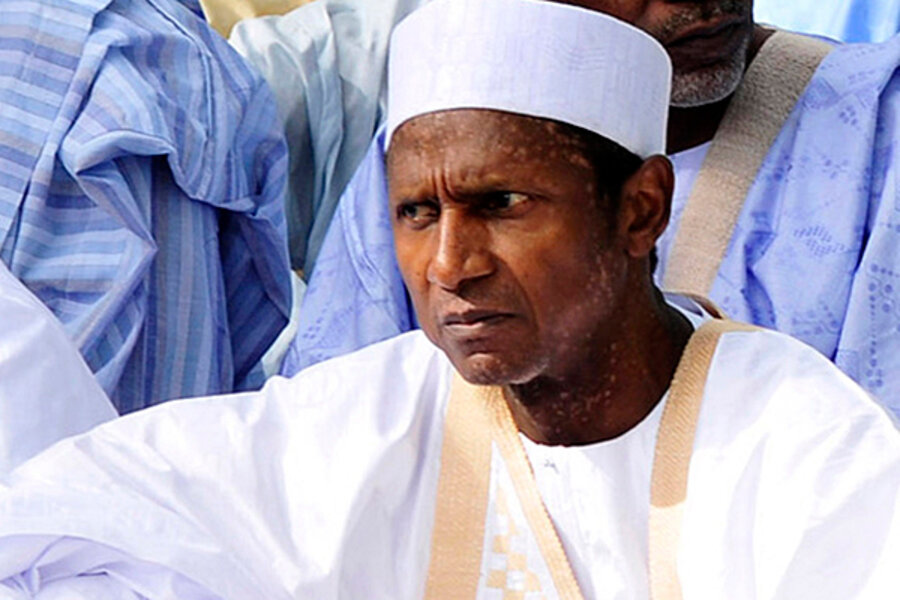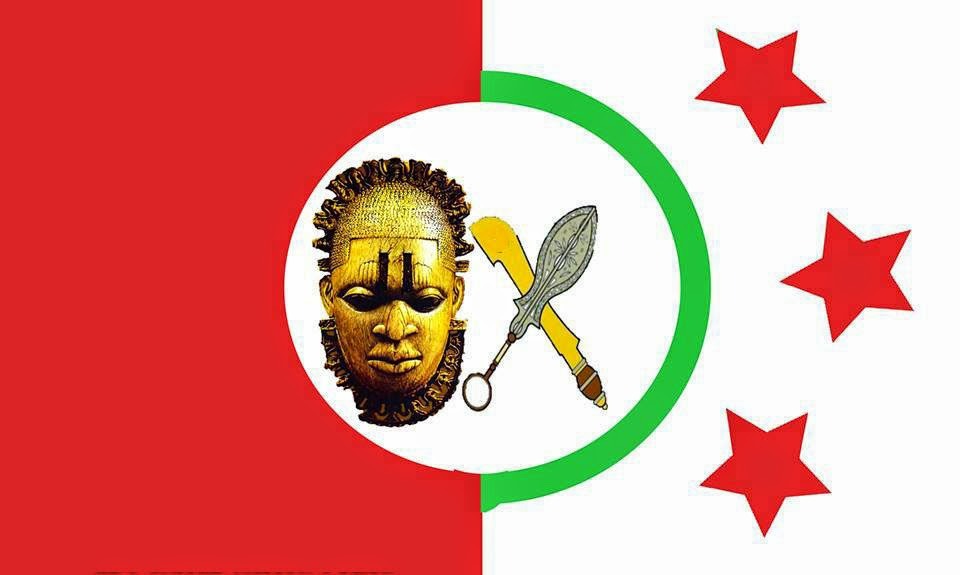THE NIGERIA - BIAFRA WAR LETTERS; A SOLDIER'S STORY (Vol. 1):
Brig. Benjamin Adekunle a.k.a. The Black Scorpion
Compiled and edited by
Abiodun A. Adekunle
http://www.adekunle.org
http://www.blackscorpion.org
--"There were giants in the earth in those days; and also after that, when
the sons of God came in
unto the daughters of men, and they bare children to them, the same became
mighty men which
were of old, men of renown."
Genesis: Chapter 6, verse 4
You shall immediately agree that anger is not the garment worn with which
one dances with angels.
So I urge you now to reverse course. Imagine this city to be a figment of
your imagination, a result
of the psychosis brought about by torment, sorrow and rage, and go away in
peace. Please. But
that you wish to continue is evidence that you wish to assert your freedom.
You wish to be free to
speak in those tongues that only your soul can understand because only your
soul knows the chains
that have shackled your liberty. Then, dear friend, you will be free.
The war did not end. But the battleground has shifted. Dynasties in this
day are rare but certainly
not unheard of. The most visible, to be sure, is that of the family of
George Bush, and that story is,
as yet, the clearest indicator of why dynasties exist. But what, the
skeptic might ask, shall we
determine to be a dynasty? I will tell you a thing, and it is this. When
the progeny of one who
pursues and controls an agenda are vested with the power to maintain control
of the agenda,
dynasties are born. And though many will profess the belief that the war
ended, though many will
suggest that they are fully aware of what, in effect, the war was truly
about, though an uneasy
silence today reigns in the heart of Bonny, a man, known to the initiated as
"the Dean," has fired a
shot that is sure to be heard around the world. And the world is taking
note.
The war, our war, projected at the behest of complex competing interests,
will be viewed by the
more careful amongst us as a war to determine the manner in which two
independent black nations
might seek to determine their destinies against the backdrop of colonial
insistences, the ramifications
of which had yet to crystallize when the first shots were fired. It is a
dangerous world in which we
live, but the poet's weapon is the book of life, and Abiodun Adenkule's
entry into the Nigerian
chapter is a most welcome addition.
The day is the modern era, the scene is a nest in the Ancient City of
Atlantis. Two poets sit down
over a barrel of beer and begin to discuss many, many things. And yet,
ultimately, one thing is the
thing that what they discuss is. The war. Our war. While Oxford will
codify the malady of a
befouled mob of naked African souls in rhetoric suggestive of the
psychological trauma effected by
the war upon the denizens of our forest, while Berlin will, with the
curiosity of a child, stare at your
cousin and attempt to localize, to analyze, to methodologically identify the
actual thing that is wrong
with the one whose head is not correct, those who know know that our war was
merely the
inevitable projection of a disagreement between two very tall men who live
in the land where giants
roam. Those understand what the quiet sage meant when, and without the
benefit of his glass of
Chardonnay for just one instant, he proposed that a war is never truly won.
A war is never truly
won. And so, these two poets, they speak of a nation called Nigeria and its
significance in the grand
scheme of matters. One of the poets, let us, for the sake of argument, say
he is me, he is at once
skeptical and appreciative of the other poet's perspective. The hey day of
the anti-Abacha
protestation is barely just over, and the temptation to lash out at men in
uniform as uninformed
goons, zombied morons who do the bidding of the Master for a mere thirty
barrels of oil, is mighty.
But when one speaks with the Dean, one captures the quiet sense that there
is always more to the
story than meets the eye. And there is no need for conspiracy theories
here. There is, indeed,
more to the story.
For, this is not a story about oil. This is not a story about atrocity.
Neither, in fact, is this story about
that aburo of mine, who, in his sun-drenched delirium, is infested with an
unyielding zeal to impose
Baal, by any name, upon the infidel pagans of the forest. The infidel
pagans, surely you have heard
of them. These are the people whose subordination was ordained by a scholar
from the Royal
Geographic Society and his counterpart, a turbaned zealot who, though
supposedly defended by the
hand of an angel, acts out in mighty fear of the Jinn from Gogobiri. No, my
friend, the story is about
a man who was one day called the Are Ona Kakanfo--the bird whose eyes can
see the truth, the
star whose glow bathes a nation, the magician by whose hands the history of
a people at war is
written.
Oba-oba once told me that it is the one who does not have eyes at the back
of his head that does
not understand what the drum is saying. By this logic, and in the spirit of
being one's brother's
keeper, it is the duty of the wise to watch the back of those who cannot see
into history, to
protect the people from the Myrmidons of darkness. But when those saddled
with this responsibility
turn their guns on their own people, when the depth of power is harnessed to
strip the sons and
daughters of a land of their dignity, then it is time for a festival of
national self-reflection. And this
festival requires no magnificent stadium. All that is requisite is the most
sublime intuition which does
not trivialize the spirit of a culture forged from the beat of a drum, a
notion of why the African mind
must be wise, intelligent, savvy, in the face of cohesive interests that
require the depth of African
foolishness for the maintenance of the sort of blindness that drives
subservience. There are many to
thank for this moment in our history, few more poignant than the general in
history whose name
rings forth from shore to shore, a man known to many as the Black Scorpion.
The Black Scorpion. Divorced from its more humble beginnings as a
compassionate octopus, it finds
itself a dramatic appellation. African warriors are famous for emphasizing
their prowess with such
invigorating poetic sojourns. Not most will forget the crazy chicken who
ate the entrails of his
enemies after pecking them to death, leaving death and destruction in his
wake... or something the
like. To be sure, those who had the misfortune of answering to Wazabanga
did not take his title so
lightly. But his ultimate demise was not merely the image of a disheveled,
disease-ridden fugitive,
forever bursting into tears at the betrayal of his subjects, but instead his
cautionary tale in the African
book of life as the warrior who was too foolish to understand the intent and
scholarship inherent in
the poetry of the great white man. What then ought we to conclude about our
own controversial
warrior, the Black Scorpion, Brigadier Benjamin Adekunle?
I must inform you that Adekunle's letters have provided an invaluable
service to those who have for
long wished to understand the psychology of the Nigerian ruling elite in the
formative years of our
forest. But for those who wish to understand the unique particulars of a
Yoruba General, this
excursion is priceless.
Now, if it is surprising that a review of Abiodun Adekunle's Book is couched
as a foray into the mind
of a Yoruba General, it is only because the book is about the mind of a
Yoruba General, and those, in
history, have rarely had the opportunity for their story to be told in their
own words. It is, in fact, a
marvelous state of affairs. You see, dear Akhenaton, a wholly detribalized
approach to our war
trivializes the complexity of the Nigerian, nay, African identity and puts
in danger those who carry the torch of our people in their heart of
darkness. In choosing to look through the eyes of Baba and
render an opinion on a scion of the Holy City near Modakeke, I have pitched
my tent with the
rhythm of the drum. Only good Africans, then, will understand what it is
that the drum is saying.
It was important to speak first of dynasties, for we must immediately tackle
the notion of agendas.
There is no gainsaying the fact that many will be those who question the
motivation behind Abiodun
Adekunle's revelations. Is it a family affair? Such questions will not
fizzle out even in the event that
the General's letters speak for themselves. What the letters tell us, in
fact, is more about a greater
war than was fought on the soil of children of our land. The modern letters
of this African General
speak, to my mind, about global power and how a people failed to understand
its utility. Perhaps
they were too illiterate to read the manual. Perhaps the words were too
big, constructs extending
towards the sky of a complexity befuddling to villagers. Perhaps they
should have gotten celebrated
scholars, experienced in these matters, to explain it in pidgin. "Na like
so we for do am." After all,
the reason we have read all these books is to understand why we continue to
fire our most potent
guns at our own children while cavorting and smiling with members of the
Academy, whose societies
are invested, by the power of inertia, in maintaining the status quo.
Perhaps Abiodun Adekunle's
book will open many eyes. But before the elders jump up and down in glee
and proclaim my friend,
the Dean, to be the Messiah Nigeria has been waiting for, I must live up to
my duty and explain, in
trenchant and relevant terms, what I believe the Dean's motivation might be.
It is, you will concede,
the right thing to do. You will concede.
If it is true that truth often escapes in the presence of a barrel of beer,
then I contend that many
are the times when truth was in the presence of myself and the Dean. We are
all political scientists
because our country does not live off its own resources. Beyond that, we
are all patriots. And
Abiodun Adekunle is not the least of them. But this should come as no
surprise to anyone. Surely,
the offspring of the elite have often been derided for a lack of
appreciation of the state of affairs,
but youth dies when wisdom beckons, and today it beckons to all the children
of Nigeria.
The landscape of Nigerian dreams is littered with brilliant patriots willing
into manifestation the day
when the African mind will be put to the service of a worthy African leader
instead of whiling away in
the luxurious gulags of modern nations, contributing their quota to the
advancement of societies
that discovered the secret of how to use power. There is a relevant adage
which I will quote in
Yoruba and it goes thus: "Awon to ga ju, 'won o ga to." A transliteration
in pidgin which captures
the spirit of the letter would be something along the lines of: "The people
wey sabi book pass, dem
never sabi book reach." And this, indeed, is the reason we must explain to
our grandmother why, if
we are so intelligent, we have not discovered the secrets that lead to order
and harmony. What
then, Prof, have we been studying all these years? Extracting order from
chaos is a problem-solving
task, but is it not? Please be sure to appreciate that this truth is
self-evident. That we are
endowed with the natural right to demand a representative government
presupposes that we have
expended the energy necessary and sufficient to reify our identity--a
synergy of nationalities, clans
and families who own the land upon which oga forced Mazi Effiong to
negotiate our non-negotiable
unity. Leave oga alone to battle evil spirits and attract foreign
investors. We do not need his
permission to actively identify and articulate the interests and aspirations
that we share. But we
must, without the slightest hesitancy, begin the process of codifying these
aspirations in so far as
they are the tangible evidence of a people united. Let history not declaim
that only the Ogoni had a
language. There are few options available to leaders who ignore the
perceptible voice of a
sovereign identity instantiated. None of them is attractive. I repeat,
none of them is attractive.
Verily, many are such who will suggest that pragmatism is in order--that we
must understand the
dynamics of history and do what we can under the prevailing circumstances.
If such are the people
who are dancing to the beat of this gbedu, then please allow me to explain
what thing that Baba
taught me. This thing, he must have wanted us all to reflect upon in the
solemn manner of wise
wizards of the Niger, the evening of whom is the echo of the moon against a
hill in Enugu beside
which a mighty iroko tree once stood. And it is this: It is because of our
shared history, not in spite
of it, that we ought to be more intelligent than men and women ever were.
Yes, yes, it is because
of our shared history, not in spite of it, that we ought to be wiser than
men and women ever were.
Indeed, Chief, it is because of our history, not in spite of it, that we
ought to be the ones whom,
when the story is told, are known as the sages who taught mankind why man
must be as intelligent
as he is moral. We are the ones entrusted with this paradigm, to convince
history that in the beat of
this drum is an ancient wisdom which must not be allowed to die at the hands
of proxies of the Royal
Geographic Society, minions whose ultimate claim to prose consists of an
incoherent clamor for a
fellow tribesman to sit at the helm of power, the fabric of which this
African nation has neglected to
grasp.
What Abiodun Adekunle has presented as an incipient interjection in the
African discussion must not
be misconstrued as an opportunity to open up old wounds or even one in which
to set the record
straight. Aside from the outcry that will almost certainly erupt over the
spelling of a certain word,
what we have here is a precious opportunity to peer into history after which
we may silently meet in
a particular quiet space--the quiet space where our Father, that wise man
who wore shining mirrors
upon his cap, resides, awaiting the day when the children of that soil will
gather and understand a
thing that the bird of war has said. If the muse of cowardice and iniquity
prevents us from
convening a legitimate national conference of qualifiable representative
constituencies on earth, then
the wise will have one in the heavens. Have faith. We will caucus in that
solemn location that you
can see because you are wise, that place where, and just for a moment in
time, the mind of the
Ancient recalls the depth of our insight and hastens to exemplify the
richness of our occasion upon
the soil that nourishes an angel with seven seals.
So long as that my aburo continues to fear a mere Jinn from Gogobiri, we
stand the risk of
maintaining our status as the world's underclass. The time, then, has come
for us to consider
carefully the implications of this war. If you take these words seriously,
then it is from this space that
a great nation will be born. For, in that quiet place, away from the
bickering and pontificating, away
from the chaos of a nation gone mad, is the silent beating of a drum. This
drum, it is the language
of our Father. And in that day, when you have read Adekunle's book, and
when you are tempted
to join the chorus of the tortured souls whose only voice is spoken in anger
or rabid excitement,
think carefully about those who have chosen, instead, to pursue somber
rumination in a very
particular place in the heavens, and wonder what it is they are discussing.
It is the concluding call to
those who heard the trumpet sound. Do not let it pass you by.
I could speak of many things. I could speak of oil and foreign interests
and titillate you with juicy
innuendo about General Jack or horrify you with images of big-bellied
children. But these matters,
even for those who once saw our land as the playground of the powerful, are
less significant than
the effect they will have on the reader. Let the eagles arise who have
earned their wings. When
we meet in that silent place where we no longer are content to vilify each
other because the pain
we feel is a consequence of history, not of the inability of a General to
redeem himself from the
bondage of the Royal Geographic Society, then we ought to realize that, yes,
it is a family affair. And
that family is our nation.
And for this very reason, that this occasion has given us the opportunity to
see a thing which only
the wise can see, we must thank Abiodun Adekunle. The sword of the wise is
the most valuable
currency in the history of our people. We ought to take advantage of the
moment.












